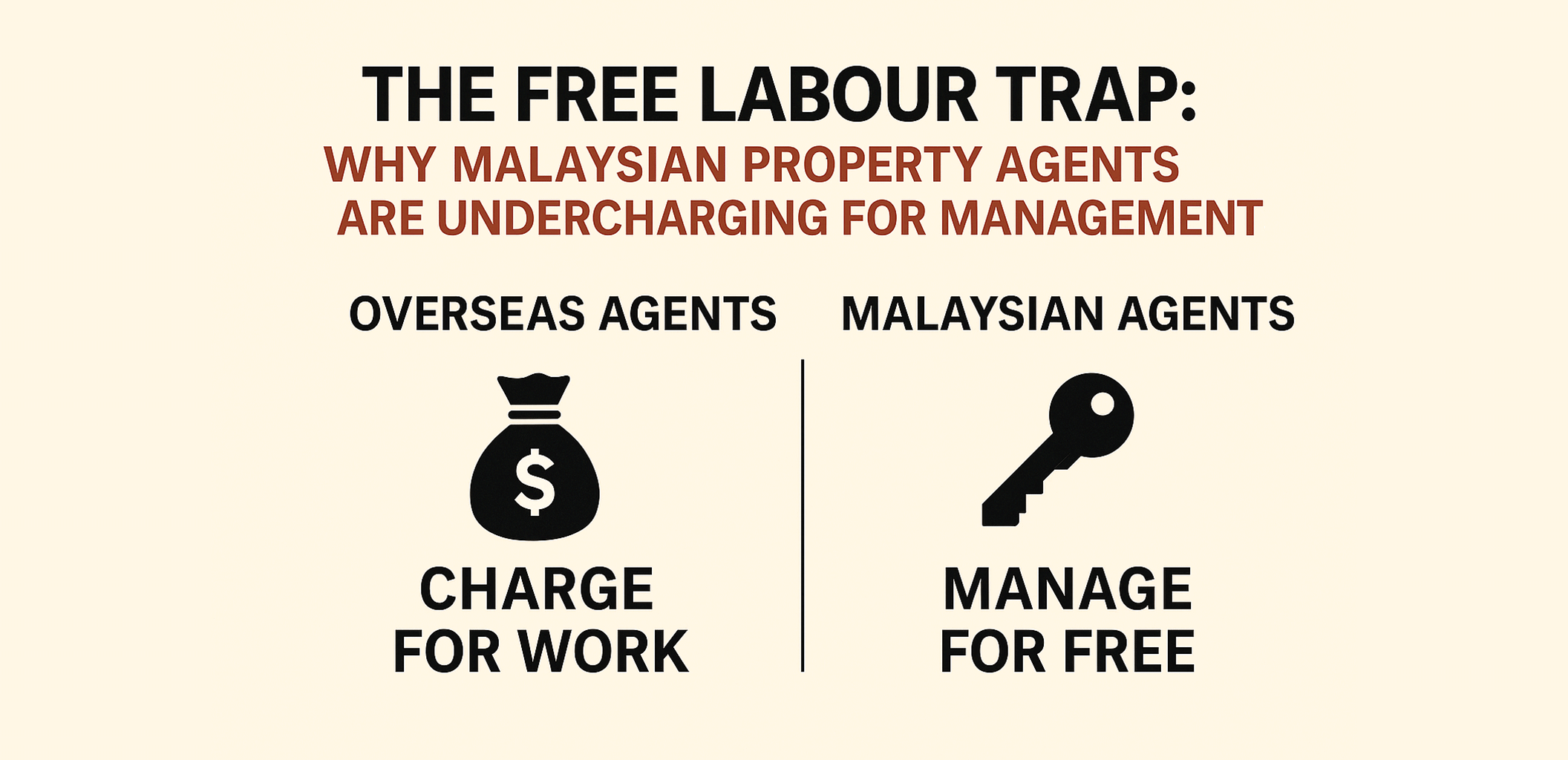The Free Labour Trap: Why Malaysian Property Agents Are Undercharging for Management

In many countries, property management is a standalone business. Agents tenant the unit, collect rent, coordinate maintenance, and charge a management fee — often between 5% and 10% of the monthly rent. But in Malaysia, the situation is very different. Most Real Estate Negotiators (RENs) who secure a tenant for a landlord end up managing the property for free — even though they were only hired to rent it out.
Why does this happen? And is it sustainable?
1. The Unspoken “After-Sales” Expectation
When a landlord is foreign (e.g., Singaporean, Hong Kong, or Middle Eastern investors) or interstate (based in Penang while owning a KL unit), they rely heavily on the agent for small but continuous help —
- Collecting keys from the tenant,
- Coordinating defects or repairs,
- Paying service charges on time,
- Dealing with slow-paying tenants.
In theory, these are property management tasks that should be billed monthly.
In practice, most Malaysian agents treat them as part of “service quality” — a free after-sales duty to maintain goodwill and future referrals.
2. Why Malaysian Agents Rarely Charge a Fee
Several structural reasons explain this cultural norm:
a. Market Oversupply of Agents
There are tens of thousands of active RENs competing for a limited number of rental listings. To stand out, agents absorb more responsibilities without charging extra.
b. Lack of Professional Boundaries
Property management in Malaysia is not always clearly separated from agency work. Landlords often assume the same agent who tenanted the unit will “take care of everything.”
c. No Clear Billing Framework
Unlike Australia or the UK, where agencies issue formal management contracts, most Malaysian agents work on handshake agreements.
Without a standard template, introducing a 5% fee feels awkward or even risky — the client might simply call another agent.
d. The Hope of Repeat Business
Many RENs justify doing it for free because they hope the owner will buy, sell, or rent again through them. In other words: they trade short-term income for long-term loyalty.
3. The Hidden Costs of “Free Management”
Managing properties for absentee owners isn’t truly free — it consumes time, fuel, and mental energy:
- Coordinating contractors and cleaners
- Handling complaints from tenants
- Reminding owners about overdue maintenance fees
- Checking on vacant units between tenancies
Each of these tasks may only take minutes, but over a year they compound into unpaid hours. Worse, when tenants default or damage property, the agent ends up being the first person blamed — with no protection or management retainer to justify the effort.
4. How Overseas Agents Handle It — and Why Malaysia Is Different
In many developed countries, property management is monetized. Agents charge a percentage of the repair or renovation amount (usually 5–10%) when they coordinate works on behalf of absentee owners — from repainting and furnishing to hiring cleaners and contractors. They also charge monthly management fees for rent collection, inspections, and tenant relations.
In Malaysia, however, most RENs still do it for free.Why? Because keeping the owner happy often comes with an unspoken perk — the agent keeps the keys.That means they can easily bring new prospects to view the unit when it’s vacant or when another tenant’s tenancy ends.
So while overseas agents monetize coordination, Malaysian agents see “free management” as a way to maintain continuous access and listing control — turning convenience into a quiet advantage.
5. The Bottom Line
Malaysian agents have long been trapped in a cycle of over-servicing and under-charging. Managing properties for foreign or interstate owners is valuable work — and it deserves to be treated as such.
As the market matures, the most professional agents will be those who can set clear boundaries, educate clients, and charge fairly for real work — instead of surviving on goodwill and spare keys.
Because the truth is simple: every free favour today reduces the value of the profession tomorrow. For landlords, this means seeking out agents who value their time and professionalism; for agents, it means having the courage to set a fair price.











































































































